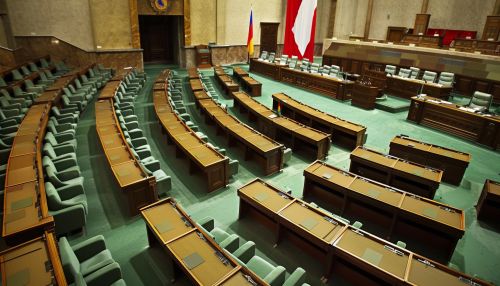Senate of Poland
History
The Senate is a vital part of the legislative authority in Poland, and its roots can be traced back to the 14th century. The Senate's inception was influenced by the political system of the Kingdom of Poland, where the king's council, comprising of high-ranking nobles and clergy, played a significant role in the governance of the state. This council eventually evolved into the Senate, which became a crucial part of the Polish-Lithuanian Commonwealth's political system.


The Senate's role and significance have varied throughout Poland's tumultuous history. During the times of the Commonwealth, it served as the upper house of the parliament, with the lower house being the Sejm. The Senate was composed of bishops and other high-ranking nobles, who had the power to veto decisions made by the Sejm. This system, known as the Liberum Veto, was unique to the Polish-Lithuanian Commonwealth and was a significant factor in its political dynamics.
The Senate's existence was interrupted during the partitions of Poland in the late 18th century, when the country was divided among Prussia, Russia, and Austria. It was not until the re-establishment of the Polish state in 1918 that the Senate was revived. However, its role was significantly reduced, serving mainly as a revising chamber for legislation passed by the Sejm.
The Senate was abolished once again during the communist era, from 1946 to 1989. The communist regime established a unicameral system, with the Sejm as the sole legislative body. However, the Senate was reinstated in 1989, following the political transformations that led to the end of communism in Poland.
Current Role and Composition
Today, the Senate plays a crucial role in the Polish legislative process. It is composed of 100 senators, who are elected for a four-year term in a direct election. The Senate's main function is to review and amend legislation passed by the Sejm. However, the Sejm has the power to override the Senate's amendments with a three-fifths majority vote.
The Senate also has several unique responsibilities. It has the authority to review and approve the appointment of certain high-ranking officials, such as the Ombudsman and the members of the National Broadcasting Council. Furthermore, the Senate has the power to initiate legislation, although this is less common than in the Sejm.
The Senate is presided over by the Marshal of the Senate, who is elected by the senators. The Marshal represents the Senate in its relations with the President, the Sejm, and other state authorities. The current Marshal of the Senate is Tomasz Grodzki, who has been in office since 2019.
Electoral System
The electoral system for the Senate is based on single-member constituencies. Each of Poland's 100 constituencies elects one senator through a first-past-the-post system. This means that the candidate with the most votes in each constituency is elected as senator.
The Senate elections are held simultaneously with the Sejm elections, usually in October. All Polish citizens who are at least 30 years old are eligible to run for the Senate. The electoral campaign is regulated by the National Electoral Commission, which ensures the fairness and transparency of the process.
Functioning and Procedures
The Senate's work is organized in sessions, which are convened by the Marshal. The Senate meets at least once every three months, but additional sessions can be convened if necessary. The sessions are open to the public and are broadcasted live on the Senate's website.
The Senate's legislative work is carried out in committees, which specialize in different areas of policy. There are currently 23 committees, including the Foreign and European Union Affairs Committee, the Human Rights and Rule of Law Committee, and the Budget and Public Finance Committee. The committees review the legislation passed by the Sejm, propose amendments, and prepare reports for the Senate's plenary sessions.
The Senate's decisions are made by majority vote. However, certain decisions, such as the adoption of a resolution to declare a state of emergency, require a two-thirds majority. The quorum for the Senate's meetings is half of the senators.
Influence and Criticism
The Senate's role in the Polish political system has been a subject of debate and criticism. Some argue that the Senate is a necessary check on the Sejm's power, while others believe that it is an unnecessary duplication of the Sejm's functions. The Senate's ability to delay legislation has also been criticized, especially in situations of political conflict between the Sejm and the Senate.
Despite these criticisms, the Senate remains a significant part of the Polish political system. Its role as a revising chamber and its unique responsibilities make it an important player in the legislative process. Moreover, the Senate's existence is a testament to Poland's commitment to parliamentary democracy and the separation of powers.
